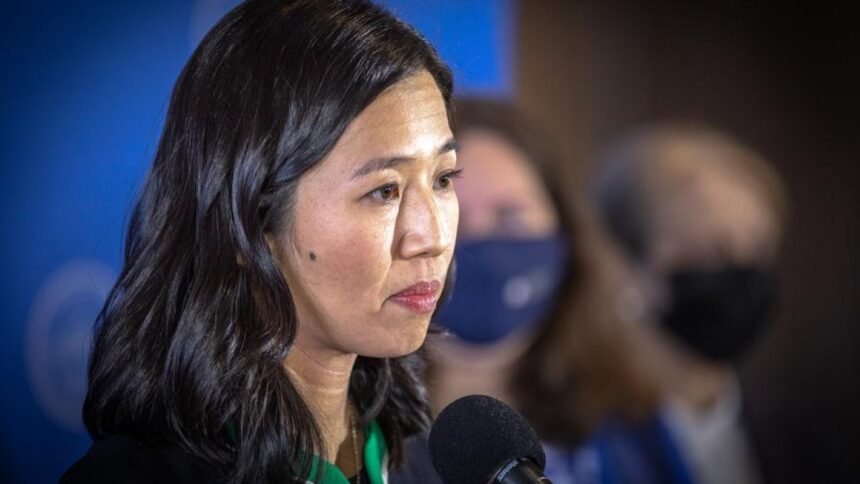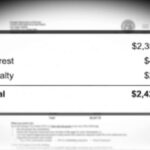With the window for the necessary state legislative action quickly closing, Boston city councilors still have many questions about a proposed tax-shift plan that has drawn the ire of some influential real estate industry leaders.
A council subcommittee spent more than four hours Thursday weighing Mayor Michelle Wu’s plan to temporarily rebalance the property tax split between residential and commercial owners, at times expanding their inquiry to revenue-generating steps the city could take.
Members of Wu’s team are hopeful for prompt action on the proposal the mayor filed nearly two months ago, which they view as a targeted strategy to smooth out a potential sudden spike in residential property taxes that could result from a drop in commercial property values.
They said Thursday that failure to secure the measure’s passage in the council and then Legislature before July 31, when lawmakers wrap up their major business for the term, could leave the city with limited or no time to react if the property-tax dominoes begin to fall.
“If we don’t have this flexibility, we will have a very narrow to no timeline available to us to get this in place if we see commercial values decline in such a way that we see a 17 or higher percent increase in residential taxes,” Ashley Groffenberger, the city’s chief financial officer and collector-treasurer, said. “If this isn’t in place, and we see that change in value and subsequent result in the residential taxes, taxpayers will have 30 days to make up an enormous increase in their taxes relative to the prior two quarters.”
Public debate about the city’s property tax levy exploded in February, when a report from the Boston Policy Institute think tank warned that a pandemic-fueled drop in commercial property represented an “economic act of God” that could eat away at the city’s tax revenues.
There’s still no clear timeline for action. Wu filed a proposed home rule petition in early April that would temporarily give city officials the ability to shift a larger portion of property taxes onto business property owners if commercial values drop, effectively sparing homeowners from making up a revenue shortfall all at once.
The council’s Committee on Government Operations met to discuss the topic Thursday, six weeks after it convened an earlier hearing about the same measure. Councilors might move next to hold an additional “working session.”
“I think there’s still a few questions that remain unanswered,” Councilor Julia Mejia said at the end of Thursday’s proceedings.
Councilor Gabriela Coletta Zapata, who chairs the committee, said she too still has “outstanding questions,” especially about an idea she floated to embrace a local-option small business tax exemption as a partial offset for the effects of the proposed rebalanced tax levy.
“We are on a very real timeline at the State House,” she said, noting that other Boston home rule petitions affecting alcohol licenses and the Boston Planning and Development Agency spent months in limbo on Beacon Hill before moving.
“This is the time to get this up there,” Coletta Zapata added about Wu’s tax plan.
Even if councilors come to an agreement to support Wu’s proposal, its outlook in the Legislature is unclear. Rep. Aaron Michlewitz, the North End Democrat who is one of the most powerful figures on Beacon Hill, so far has avoided taking a stance on the measure.
The Legislature also has a mountain of its own business to address, including high-profile housing and economic development bond bills that still need to be introduced, approved in both chambers and reconciled in the next two months. That could leave limited bandwidth to take up a Boston-only priority, no matter how dire the warnings are from City Hall.
Under state law, municipalities can create separate tax rates for commercial and residential property and require commercial owners to pay up to 175% of what the single, unified property tax rate would have been.
Wu proposed giving the city the ability to increase the maximum commercial shift as high as 200% if business property values drop significantly, then reducing it a bit each year until it returns to 175% in the fifth year.
Homeowners would likely still need to pay higher property taxes if commercial values drop, but officials believe the temporary shift would phase in the increase instead of allowing it to hit all at once.
“This is just spread out over a couple of years. This isn’t ‘save the residents, tax the commercial’ — you’re going to have to pay that full amount anyway and in not that long a period of time, and potentially do irreparable harm to our downtown core and our neighborhood small businesses,” Councilor John Fitzgerald said Thursday.
Marty Walz, a former state representative and lobbyist who is interim president of the Boston Municipal Research Bureau, said the city could achieve “more of a shared sacrifice” by keeping the commercial property tax shift at a lower figure than 200% — in other words, make a change similar to Wu’s idea, but to a lesser degree.
“I honestly think that’s a good one,” Boston Assessing Commissioner Nicholas Ariniello said of the idea Walz floated. “The beauty of the proposal is that we have that flexibility and that ability to decide that. It doesn’t change anything about the administration and the council’s responsibility and duty and ability to set a shift every single year. Even if this legislation were passed, we wouldn’t have to go up to the 175 percent shift if we felt that that was not the appropriate level to reach. It gives us the flexibility to choose the right amount.”
Wu’s proposal has drawn criticism from groups such as the Greater Boston Real Estate Board, whose CEO argued last month that adding more tax burden to commercial property owners “could do irreparable harm to an already struggling industry.”
Several affordable housing advocates, community organizers and labor leaders used Thursday’s hearing to line up in support of the plan, arguing that failing to soften a possible residential tax hike could add even more fuel to the housing crisis.
Symone Crawford, executive director of the Massachusetts Affordable Housing Alliance, told a council subcommittee that homeowners and those looking to buy houses in the city already face a steep climb due to high interest rates and soaring prices.
“A tax increase on our homeowners would also be a burden that most of us could not rebound from,” she said.
Representatives from civic groups such as the Charlestown Neighborhood Council and some labor unions also voiced support for the proposal during the early stretch of Thursday’s hearing.
Some councilors and attendees signaled Thursday they want to rethink the city’s reliance on property tax as such a major source of revenue. The Boston Policy Institute report estimated that property tax collections currently make up 75% of the city’s revenue, up from 54% in 2002.
Walz said her group is researching other “revenue diversification” options and described a need to put the topic “back at the top of our collective agenda.”
“We’ve had the luxury over the past number of years of not having to think very hard about this. I think that those days are over now,” Walz said. “That’s a longer-term solution because we can’t just flip a switch and make that happen. It’s likely to require going back to the Legislature. But it’s something that if we start now, we will be ready by next year to perhaps do another home rule petition.”
“It’s a two-edged sword. It’s a blessing and a curse,” replied Councilor Liz Breadon. “Now we’re facing the consequences. The City Council and all of us need to really put our minds to seriously looking for other revenue sources so we’re not so incredibly reliant on real estate taxes to pay our bills in the city.”
As Thursday’s hearing wrapped up, Coletta Zapata urged more city residents to get in touch with councilors and share their opinions on the topic. Even a one- or two-sentence message would suffice, she said.
“There has not been as much participation as I thought there would be,” she said.











